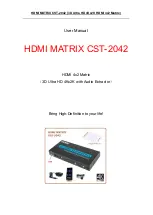
XTP CrossPoint Series • Installation
25
Analog audio output connectors
Connect audio devices, such as an audio amplifier or powered speakers, to these 3.5 mm,
5-pole captive screw connectors. These connectors output the tied unamplified, line level
audio. See figure 25 to wire an output connector. Use the supplied tie-wrap to strap the
audio cable to the extended tail of the connector.
Unbalanced Stereo Output
Balanced Stereo Output
Do not tin the wires!
Tip
NO GROUND HERE
NO GROUND HERE
Tip
LR
Sleeves
Tip
Ring
Tip
Ring
LR
Figure 25.
Captive Screw Connector Wiring for Audio Outputs
ATTENTION:
•
For unbalanced audio, connect the sleeves to the ground contact. DO NOT
connect the sleeves to the negative (-) contacts.
•
Pour l’audio asymétrique, connectez les manchons au contact au sol. Ne PAS
connecter les manchons aux contacts négatifs (–).
•
The length of exposed wires is important. The ideal length is 3/16 inch (5 mm) (see
the
•
La longueur des câbles exposés est importante lorsque l’on entreprend de les
dénuder. La longueur idéale est de 5 mm (3/16 inches) (voir les
page 22 pour plus d’informations).
NOTE:
The audio that is output on these connectors is converted from the tied
embedded input signal or the analog audio input. This feature allows you to duplicate
the outputs while eliminating the need for extra receivers.
The volume level for each analog output can be individually set via the front panel or remote
control (see
Viewing and Adjusting the Analog Output Volume
on page 54). You can
also use an
(see page 104), the XTP System Configuration software (see
the
XTP System Configuration Software Help File
, available at
Changing the output volume level
By default, the audio ties follow the video ties. Audio breakaway, which can be activated
via the front panel or under remote control, allows you to select from any one of the
audio input sources and route it separately from its corresponding video source (see
Example 3: Remove a tie from a set of ties
on page 40). You can also use an
(see page 87), the XTP System Configuration software (see the XTP
System Configuration Software help file, available at
















































